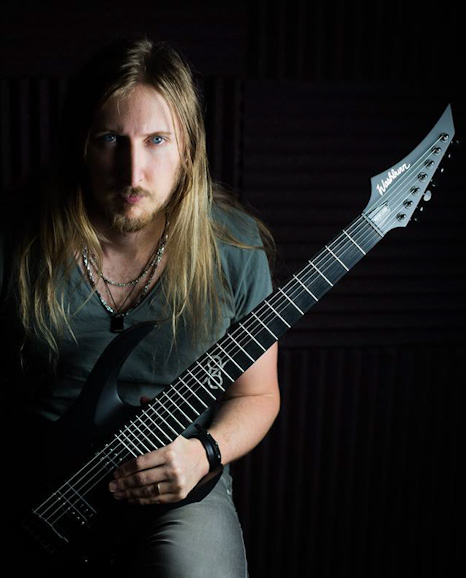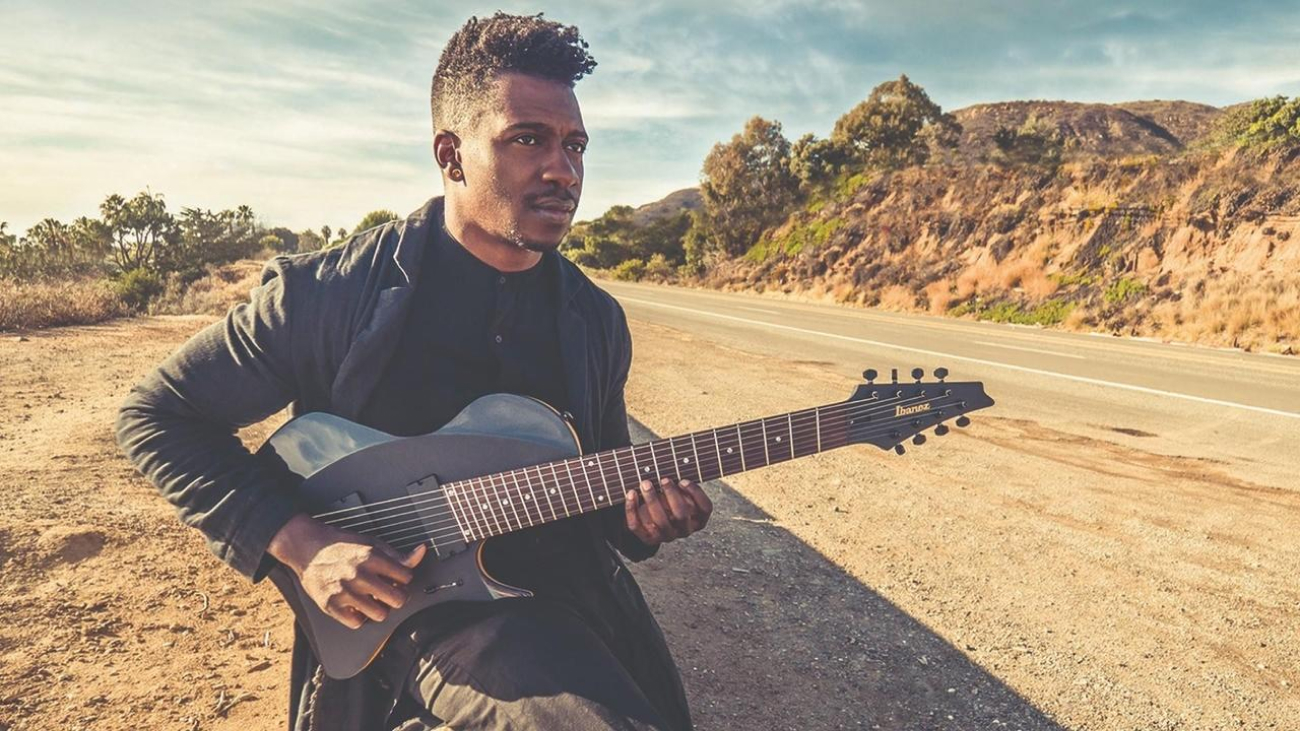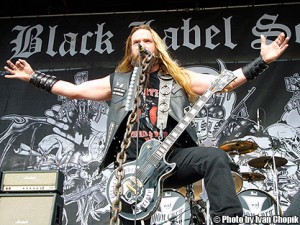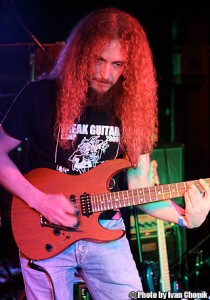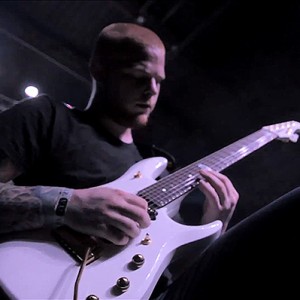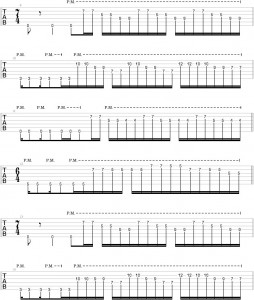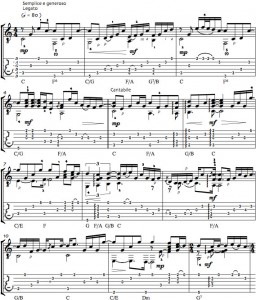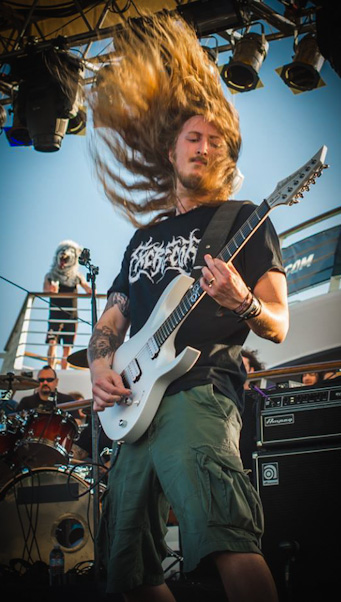 Ola Englund is living the dream. The gear-demoing guru and ferociously accurate riff machine from Swedish bands Feared and The Haunted is an incredible example of a musician who replaced his day job by turning his hobby into full-time work. At this year’s NAMM, Ola spoke with Guitar Messenger’s Ivan Chopik and offered his inspiring perspective on being your own boss, living both at home and on the road, and building a career around high-quality gear videos:
Ola Englund is living the dream. The gear-demoing guru and ferociously accurate riff machine from Swedish bands Feared and The Haunted is an incredible example of a musician who replaced his day job by turning his hobby into full-time work. At this year’s NAMM, Ola spoke with Guitar Messenger’s Ivan Chopik and offered his inspiring perspective on being your own boss, living both at home and on the road, and building a career around high-quality gear videos:
IC: How’s the NAMM show been treating you?
OE: It’s been very busy. We’re launching both my signature amplifier with Randall, The Satan, and also my Washburn Solar series, so it’s two things at the same time. But at least they’re in the same booth, so I don’t really need to jump around that much. But it’s been busy – meetings and interviews, and just hanging around shaking people’s hands. Sanitizer, shaking people’s hands… [laughter]
IC: You’ve got quite a busy year ahead of you. You’ve got a new release with The Haunted, you’re doing stuff with Feared, and of course you’re running your YouTube channel – which I don’t know how you manage, because I do a lot of video work as well, and I know it takes a lot of time.
OE: It does. It does.
IC: So how do you balance everything?
OE: I mean, I have a pretty good work ethic. I quit my job two years ago, and before that I was working as an accountant. So I had a lot of responsibilities, and working 8 to 5 – that work ethic, I brought that into what I do now. So I try to keep myself disciplined. I start at 8, I walk my son to daycare, and at 4:30 I pick him up.
In between that [time] I work my ass off, and then after 4:30 I just have family time. I think it’s really important for results that I have this time everyday, and don’t really overwork on weekends and stuff like that. I’m very good at planning. I think it’s all about planning, really, and time management. But it’s hard. But nowadays you really need to work your ass off if you want to be able to support your family with it. And there’s no room for fuck ups. [laughs]
IC: I liked the fact that you mentioned that it’s also important that you don’t overwork on weekends. Finding that time off is almost as important as the time when you’re working hard.
OE: Definitely. I mean, a big source of my inspiration is my family – my wife and my son. Having that downtime on the weekends and in the evenings is very important for me to be productive during the weekdays. They keep me going and they keep my spirits up, and they’re my biggest fans and it’s so easy in a way. I have it very easy, because my life outside of my work is so awesome, and my work is also awesome. So it might sound like it’s hard work, but it’s not for me, because I’m really having a good time doing it. I don’t want to show off, but my life is pretty awesome.
IC: [You’re] living the dream, man; playing guitar, making videos and having that be your living, and having a family, too.
OE: Yeah. I definitely recommend trying it at least once in a lifetime.
IC: Talk to me a little bit about your workflow. On a typical day when you sit down to work, how do you plan out some of your videos?
OE: A typical workday would start with me grabbing my cup of coffee, checking Facebook, making sure I read all the messages, answer all the people I can (my fans and followers that ask me questions), and just make sure that everyone’s happy. That’s something I consider really important, just to answer quickly with emails, because I want to show that I’m a professional and I’m sincere with what I do. I don’t really want to keep anyone waiting. Then after that, on a Monday for instance, I try to plan the whole week. Like ‘Okay, I’ve got a new product coming from Company A on Tuesday – I’ll dedicate my whole Wednesday for doing the video, recording, and video editing.’ I do have a problem doing several things in a day, so I usually pick out days where I do the video editing, I pick out another day to practice guitar, practice the Haunted, or I’ll have a day for mainly just writing songs. That’s basically how I do it, and that’s what I do every week – when I’m not touring that is.
IC: I think you brought up an interesting point that you’re not really multitasking ever.
OE: I think so, because at least for writing, for me, I get into a kind of flow and I want to keep up the momentum. So I start my day with writing, because it kind of sucks if I’ve been playing guitar all day, just practicing and I try to [start] writing songs at 2:00, and I get into a really cool flow, get some really awesome riffs, and then at 4:30 I need to go and pick up my son. So I kind of like being focused on one thing everyday. It’s easier for me.
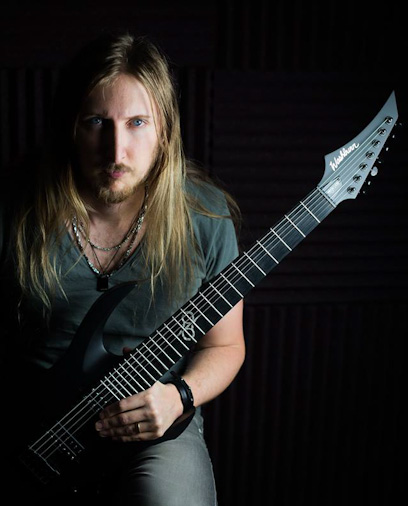
IC: How did you first get into [your line of work]? Because not all of us can just say, ‘I’m going to hit up a company and see if they can pay me to talk about my gear.’ How did you get started with it?
OE: Well, it was actually right after my first NAMM two years ago, because before that I hadn’t really been out and I hadn’t really met any of my followers. I didn’t even know how big I was. Facebook isn’t real, it’s just a bunch of names on a screen. You have no idea who these people are.
So at NAMM 2012 was my first time being out amongst people, and I was kind of blown away by how many people recognized me, and wanted to come hang with me and take pictures and all that. So I was like, ‘Whoa, I might be on to something’ and apparently people like what I do. So basically, when I got home I already had plans to cut down on my accounting job – to do both really, but after that I decided I would quit my job entirely and just focus on this.
Pretty funny – just after that, Chris Barnes gave me a call and asked me to join Six Feet Under, so I got off pretty easy. It was a pretty perfect opportunity for me to go out on tour for a year. That was basically my first year, just touring and playing with Six Feet Under and recording albums and all that. It didn’t really end up the way I planned; I planned to do videos, but it became more of a touring thing, which is cool. I got kind of a crash course in touring. I did a couple of US tours, a couple of European tours in 2012 and it was a really fun experience, especially for me. I hadn’t toured before, so staying on a tour bus and smelling disgusting… all that. Yeah, I’m never looking back. At least right now, I can’t go back to a desk job.
IC: I don’t blame you.
OE: I’ll try and do this as long as I can. But times change. You’ve got to adapt to whatever situation you’re in.
IC: Do you see more touring in your near future?
OE: I see not as much as with Six Feet Under, but with The Haunted – when I joined The Haunted, they made pretty clear to me that they were not after long tours. They’re all older, they have day jobs, so they’re doing more like exclusive festivals, fly-in shows, and to be honest that’s perfectly fine with me, because the hard part about touring is being away from my son and my family. Now I guess, it’s even more perfect. We go away on weekends, play a couple shows here and there, and it’s basically a better, more fitting band for me in that way. Now I will also start doing clinics this year for Randall and Washburn, so I will travel a lot, but mainly just shorter runs so I don’t have to be apart from my son that much. I’m very happy with the outcome as it is right now.
IC: I’m curious about the business model [with regards to demoing gear], because I think people are more familiar with how typical record and publishing deals work, for example, but this is something a little bit different that I don’t think has been discussed as much. So what are these relationships like with the gear companies, and how does that work? Did you first decide, ‘I’m going to review some things and see what happens?’
OE: Right. The demoing started as a hobby. I was recording amps because I like gear – I love gear, to even say that. So I recorded amps, and then people wanted me to record their amps, and I live in Stockholm, which is a pretty big town. There are a lot of guitar players there and they all had the amps, so I kind of drove around Stockholm in the suburbs picking up amps, and leaving amps and recording them. That was just for fun. But eventually brands picked it up and like, ‘Whoa, this guy got a lot of hits, and he kind of makes our stuff sound good.’ So they started to say ‘Hey, man. We can send you this amp, and you can tell us what you think and do a demo or something like that.’ So eventually it kicked in where all the brands would send me their amps, so I didn’t really have to drive around anymore. So that was pretty cool.
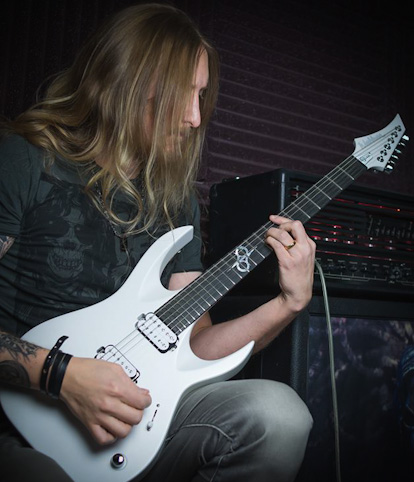
But about the model: I guess yeah, it’s a new business model, but you make your own business model, I would say. In my case, I’m my own boss and I decide what I do, so if I don’t really want to do demos anymore I can stop it right now and just do music, and go tour and all that. The freedom I have is worth so much, and the same goes with record deals. Feared, for instance, isn’t on any label – it’s just me doing everything. I’m printing everything, I’m marketing everything, and it leaves me with such freedom to do whatever I want.
I have my own time limits, and I can just see that ‘the month of November to December I don’t have any tours or anything like that, so okay, I can try to write my own album now and release it a bit later.’ I just take it as it comes at the time, and I’m really liking the way I have it right now – I have both bands that I work with. The Haunted is on Century Media, so I’m glad that I have that and can get an insight of how it really works with a record label. But I also have the freedom with Feared to do whatever I want.
IC: What are you listening to these days?
OE: This past year I’ve been listening a lot to David Maxim Micic, and Bilo 3.0, his album.
IC: It’s amazing.
OE: It’s amazing, and that’s just one guy from Serbia, I think. I mean, just the production and all his songwriting, it’s all just perfect. That’s so inspiring for a guy like me. I kind of see where he’s coming from. He’s doing it all by himself, he releases the album for himself. It’s so inspiring to see someone else do the exact same thing and do it so well. That’s mainly what I’ve been listening to the past year since it’s been released. I’m also listening to the latest Carcass, which I think is a really good comeback album. I really hope The Haunted could do a comeback album like that. So that’s also something really awesome that I’m really impressed by – how you can really come back with such an awesome album after all these years. That’s basically it. It’s both the metal and the djent kind-of instrumental stuff that Bilo is about. That’s it.
PART TWO
Click HERE to check out PART TWO of our interview with Ola, where he gives us the lowdown on his latest gear and offers some advice for aspiring musicians, and this lesson, where he teaches us to play The Haunted’s ‘Eye Of The Storm!’
Ola Englund: Mesa Boogie Dual Rectifier // Randall ISO4x12 |
[Special thanks to Chris Dingman and Alexander Pierce for their fantastic video work, and Chris’ additional editing assistance!]



